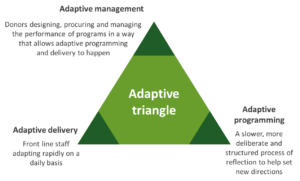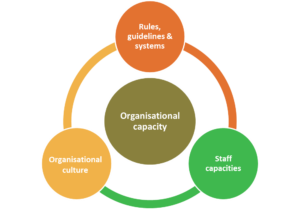Itad has recently completed a strategic evaluation for Sida to help them work through how they can best manage programmes that are adaptive and apply systems approaches. In doing this, the evaluation focused on Sida’s growing portfolio of MSD projects. But the conclusions from the evaluation about what funders need to do to manage adaptively are of broader relevance – both across the spectrum of Sida’s programming and to other donors interested in adaptive management.
The work builds on Itad’s close involvement in evaluating and supporting the delivery of a variety of Market Systems Development (MSD) programmes, and adaptive programmes in other areas, including governance, empowerment and accountability, and climate resilience.
Why the donor matters
At the heart of this work is the understanding that donors play an important role in providing the enabling environment for adaptive programming and adaptive delivery to happen. Recent work carried out by Itad in partnership with Oxfam for a DFID-funded research programme conceptualises these roles in an ‘adaptive triangle’.
In the triangle, adaptive management is how funders and commissioners design, procure and manage the performance of projects to ‘allow’ agency and space needed for adaptive programming and delivery (frontline staff adapting rapidly on a daily basis) to happen in practice. All three elements must be working together effectively if programmes are to learn, adapt and improve from their experience.
Was MSD a good a case study for adaptive approaches to development?
We argue that the MSD approach is not intrinsically different from how most development cooperation should be pursued. MSD is characterised by an approach that is facilitative, market systems-centric and adaptive.

Both approaches tailor project design to the context. We compared MSD to the principles of ‘Doing Development Differently’ (DDD) and found:
- Both approaches recognise complexity and that those designing and delivering interventions have imperfect knowledge about the context.
- Both approaches recognise the system they operate in and that intervention tactics must acknowledge this if they are to contributes to change that is legitimate, relevant and sustainable.
We, therefore, argue that recommendations arising from this evaluation on how Sida can best manage its MSD portfolio are of relevance more broadly to donors that want to create conducive conditions for systems approaches and adaptive management.
What should funders be doing?
The evaluation looked at each stage of the project cycle and assessed Sida’s management approaches compared to commonly regarded best practice (see the MSD Criteria for each stage in the Evaluation Report). But identifying what Sida should be doing was the easy part. How they should change to achieve this is the greater challenge.
Recognising this, the evaluation applied a conceptual framework for understanding organisational capacity as being the product of three key components: policies, guidelines and systems; staff capacities; and organisational culture.
Policies and systems are the ‘hardware’ of an  organisation but policies and systems alone will not change behaviour. Staff also need to have the skills and knowledge to follow policies and put systems into practice. And there needs to be an enabling organisational culture that supports the implementation of policies and systems.
organisation but policies and systems alone will not change behaviour. Staff also need to have the skills and knowledge to follow policies and put systems into practice. And there needs to be an enabling organisational culture that supports the implementation of policies and systems.
This helped us to reconcile the list of ‘shoulds’ with these three components to understand what needs to change and how to make this change happen.
What does this mean for Sida?
In the case of Sida, we identified several factors related to organisational capacity that limit Sida’s ability to manage MSD programs effectively, and its capacity to ensure good development programming more generally. We found that Sida has a relatively flexible framework of rules, guidelines and systems which give staff the space they need to innovate and manage programmes adaptively. However, we found that the application of the policies was influenced by staff interpretation of the system and Sida needs to invest more deliberately in building the capacity of its staff in relevant areas so they have the knowledge and confidence to take advantage of the flexibility in the rules.
In addition, we found that there was not a strong and consistent endorsement of the value of MSD and other adaptive management approaches and that leadership should more actively and consistently support and incentivise a culture of experimentation and active learning to inform adaptive management.
For more information about the evaluation findings please read the full report available on the Sida website, listen to Tim Ruffer present the evaluation findings to the DCED MSD Working Group members or watch him present the findings at Stockholm Evaluation Week.

